2021-22
Health Sciences
Diversity, Equity and Inclusion Annual Report
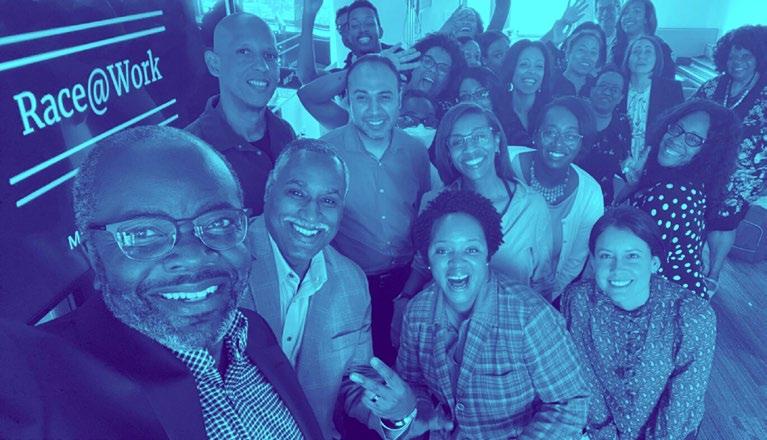
Message from the Senior Vice Chancellor for the Health Sciences




Income inequality, racial prejudice and lack of trust in the health care system make people’s lives worse. At the University of Pittsburgh Health Sciences, we have a culture of commitment to diversity and excellence, supported by the confidence that we can actually ameliorate these conditions and achieve the goals that we must reach to create a just community and deliver high-quality health care to everyone. From education to recruitment to social justice engagement, the work of the Office of Health Sciences Diversity, Equity and Inclusion moves us closer to accomplishing those objectives.
 —Anantha Shekhar, MD, PhD Senior Vice Chancellor for the Health Sciences, and John and Gertrude Petersen Dean, School of Medicine
—Anantha Shekhar, MD, PhD Senior Vice Chancellor for the Health Sciences, and John and Gertrude Petersen Dean, School of Medicine
Report 3 2 University of
2021–22 Health Sciences Diversity, Equity and Inclusion Annual
Pittsburgh
Message from the Associate Vice Chancellor

While COVID-19 has become a part of the fabric of our daily lives, 2021-22 saw a return to on-campus operation, in-class instruction and in-person interaction. We’re forging ahead!
This report is an overview of the Office of Health Sciences Diversity, Equity and Inclusion’s (HSDEI) efforts for the past academic year. In addition to leading 50+ workshops, talks and activities, we launched two significant efforts: the Social Justice Faculty Fellowship program and the Health Sciences Intergroup Dialogue effort. The former partners junior faculty with community as they learn to bring a social justice lens to their work and to the academy. The latter trains health sciences community members to facilitate face-to-face conversations among individuals of differing identities with the goal of creating space for exchange and understanding.
We continue to work with the Office of the Provost and the Vice Provost for Faculty Di versity and Development team to advance the University’s Race and Social Determinants of Equity, Health and Well-being Cluster Hire and Retention Initiative. The effort continues to grow our diverse faculty representation while we work to create a campus climate conducive to their retention.
On the staffing front, we welcomed Lisa Strother Upsher to the role of HSDEI director. Lisa comes to us with rich community contacts from the Center on Organ Recovery and Educa tion, having served as the Minority Organ Tissue Transplant Education Program director and outreach coordinator for multicultural and faith-based communities. Secondly, we welcomed Karla Perelstine to the team as communications specialist after having served as our communication intern while she completed her master’s degree in education. Finally, we are pleased to recognize Bee Schindler’s contributions by promoting them to be the inaugural assistant director of health sciences diversity, equity and inclusion.
Areas of inequity in health and education persist, and we continue to examine policies, processes and practices to create a just and equitable health sciences community. Enjoy this annual retrospective; we look forward to your feedback and future partnership.
 Paula K. Davis, MA, CDE Associate Vice Chancellor for Diversity, Equity and Inclusion Schools of the Health Sciences
Paula K. Davis, MA, CDE Associate Vice Chancellor for Diversity, Equity and Inclusion Schools of the Health Sciences


4 University of Pittsburgh
Greetings!
2021–22 Health Sciences Diversity, Equity and Inclusion Annual Report 5
“In many schools, the approach to diverse, equitable and inclusive recruitment is passive. But this isn’t the field of dreams—you know, ‘If you build it, they will come.’ They’re not coming. You have to build relationships with people.”
—Paula K. Davis
Our Mission
The Office of Health Sciences Diversity, Equity and Inclusion (HSDEI) exists to foster an inclusive environment for students, trainees and faculty within the health sciences.

Our mission also includes increasing the number of well-trained professionals who reflect the breadth of the human condition.
Our Purpose
HSDEI was established in October 2007 to:
• as sist departments within the health sciences to seek qualified, diverse candidates for academic opportunities;
• as sess internal and external pathways to graduate and health professions education and build programming to bridge any existing gaps;
• connect individuals at all points of the pipeline to role models, mentors and opportunities;
• convene experts in the academy and community partnerships to foster environments and lend best practices for sustaining practices and processes of diversity, equity and inclusion, including student-facing and professional development for staff, faculty and leadership;
• as sist schools in securing campus and extramural funding for programs and initiatives advancing faculty and student diversity; and
• create and monitor systems of evaluation that measure success for diversity and inclusion, including overall faculty, resident, fellow and student success.



6 University of Pittsburgh 2021–22 Health Sciences Diversity, Equity and Inclusion Annual Report 7
of Health Sciences Diversity, Equity and Inclusion 2021-22
the Numbers 48 Trainings and workshops offered 7,000 People reached in town halls, workshops or special events 50+ Number of University units and offices benefiting from our programs $23,375 Estimated cost savings and value of programs offered Examples of training and enrichment topics: • Implicit Bias and Positionality • Building a Lab Culture • Building Equity in University-Community Relationships
Bridging the Racial Divide
Student Mental Health
Diversity Awareness Exploration
Black Women’s Health: Past, Present and Future
Diverse Learners
Office
By
•
•
•
•
•
Students underrepresented in the health sciences engage in mentoring and networking opportunities through HSDEI programming.
Members of the HSDEI team strategize on programs and processes.
Making Pitt Work: Meet Our Directors
Lisa Strother Upsher
MSOL Director, HSDEI

Lisa Strother Upsher joined HSDEI after leading diversity, equity and inclusion ef forts at the Center for Organ Recovery and Education (CORE). Lisa was instrumental in having CORE declared a site of the Minority Organ Tissue Transplant Education Program (MOTTEP), which promotes positive health behaviors through public education by focusing on diseases and behaviors that lead to the need for transplantation in minoritized communities.
As the new HSDEI director, Strother Upsher has introduced the con cept of transformational and transactional leadership. She believes that it is important to inspire employees in ways that go beyond exchanges and rewards. This approach continues to increase the team’s intrinsic motivation by expressing the value and purpose behind the organization’s goals. In contrast, she uses transactional leadership to give employees positive reinforcement for meeting specific goals and deadlines. As an organiza tional leader, she balances these styles to help the HSDEI team reach its full potential.
The vision for HSDEI is to develop staff community-of-practice goals:

1)Build a network of community engagement practitioners who can support and mentor one another;

2)Advance community engagement at Pitt; and
3)Strengthen their practice of community engagement.
What is a community of practice? A community of practice (CoP) is a group of people who share a common concern, a set of problems or an interest in a topic. The community comes together to fulfill both indi
vidual and group goals. CoPs often focus on sharing best practices and creating new knowledge to advance a domain of professional practice. Interaction on an ongoing basis is an important part of this. Many communities of practice rely on face-to-face meetings as well as web-based collaborative environments to communicate, connect and conduct community activities.
Schindler EdD, MSW Assistant Director, HSDEI
Bee Schindler’s role as assistant director comes on the heels of completing their Doctor of Education, where it was essen tial to think deeply about best practices in diversity, equity and inclusion work tied to the office, including humanizing the work of the health sciences; being in reciprocal practice in campus-community partnerships; and continuing to mea sure HSDEI’s impact through evaluation.

Schindler advances the translation of knowledge in their commit ment to training and enrichment with students, staff and faculty in the Schools of the Health Sciences and across the University more broadly. As program manager of the inaugural Social Justice Fellowship, they serve as a lead in the “skilling-up” of faculty members who engage in community-partnered work for the fellowship year. This outward-facing work mirrors the CoP fostered in-house at HSDEI by creating part nerships for mentoring and support in order to advance community engagement.
Schindler works with colleagues to produce programming and initiatives that are informed by an understanding history, a mindfulness of the present and in anticipation of a changing future.
Noble
A-W Maseru
PhD, MPH
 Director
Director

of Social Justice, Racial Equity and Faculty Engagement, HSDEI
Noble A-W Maseru also engages the CoP model while furthering transdisciplinary, collaborative racial and health equity work across the health sciences.
Maseru leads the Social Justice Fellowship by guiding faculty on where and how to imbue social justice throughout their work, while carving out spaces in the design of the fellowship to connect and build cohorts when working around community-led initiatives.
Within the health sciences, he continues to form strategic collabo rations, working with HSDEI initiatives through programming and curriculum reshaping.
Maseru’s many accomplishments underscore the critical need to design work and processes in the health sciences that engage faculty members in learning and in experiences that address structural inequity and racism.
8
2021–22 Health Sciences Diversity, Equity and Inclusion Annual Report 9
University of Pittsburgh
Bee
Bee Schindler facilitates a diversity, equity and inclusion orientation with Biomedical Masters Program students.
Health Sciences Intergroup Dialogue Train the Trainer
During its inaugural year, the Health Sciences Intergroup Dialogue (IGD) Train the Trainer program, facilitated by Erika Gold Kestenberg, PhD, and Mario Browne, MPH, CHES, CDP provided a “brave space” for fourteen participants from throughout the University of Pittsburgh to learn the effective use of dialogue.
The cohort met for eight weeks to gain the skills and confidence necessary for training and supporting others from their respective units and schools in the use of IGD. IGD allows for face-toface conversations between individuals of differing identities to create space and understanding. The class culminated in a capstone project where the cohort led an IGD on a topic of their own choosing.
Mario Browne, Associate Dean for Equity, Engagement and Justice, Department of Pharmacy and Therapeutics, and Associate Professor of Pharmacy and Therapeutics, School of Pharmacy

Social justice demands a clear stance on fairness by illuminating inequities in need of disruption. Moving toward health equity, we focus on bridging the campus-commu nity engagements to leverage the lived experiences, making the University work relevant and sustainable. Our partner ships of impact are rooted in social justice. We seek to deepen our relationships to achieve just health and wellness for all.

 —Noble
—Noble
A-W Maseru, PhD, MPH
Social Justice Impact


Social Justice Faculty Fellowship
In an effort to educate and raise awareness of health inequities that exist in the commu nity, HSDEI launched the Social Justice Faculty Fellowship program. This program recognizes faculty members in each of the six health sciences schools (Dental Medicine, Health and Rehabilitation Sciences, Medicine, Nursing, Pharmacy and Public Health) that are committed to social justice and equity. Establishing the fellowship reflects the vision of Anantha Shekhar, MD, PhD, for activism that conjoins a “culture of health” and “empowerment activism” through a collaborative and interdisciplinary academic health sciences framework.
Noble A-W Maseru, PhD, MPH, directs the pro gram, while Bee Schindler, EdD, MSW, serves as project coordinator.
10 University of Pittsburgh 2021–22 Health Sciences Diversity, Equity and Inclusion Annual Report 11
Erika Gold Kestenberg, Diversity, Inclusion, Equity and Justice Consultant
Race and Social Determinants of Equity, Health and Well-Being Cluster Hire and Retention Initiative
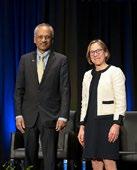

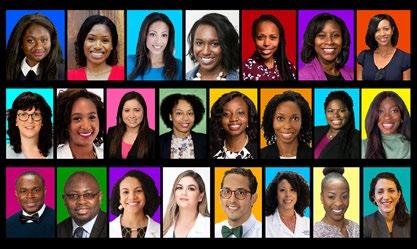
Building upon the Plan for Pitt the University of Pittsburgh has committed itself to increasing the number of faculty to conduct research, educate students and engage n service designed to eliminate racial disparities and improve measures of equity and well-being in the Pittsburgh region, nationally and around the world. The initiative is cochaired by Paula K. Davis, MA, CDE, associate vice chancellor for health sciences diversity, equity and inclusion, and John Wallace, PhD, vice provost for faculty diversity and develop ment, and supported by the Office of the Provost; Office of the Senior Vice Chancellor, Health Sciences; Center on Race and Social Problems; and the Institute for Clinical Research and Education.
In its second year, the cluster hire initiative has made great strides in achieving the goals of the four-year plan. To date, 36 health sciences faculty members have been hired across various departments, such as neurology, oral and craniofacial sciences, pharmacy and therapeutics, epidemiology, and others. The faculty bring with them a wealth of academic interests and research expertise, including research aimed at reducing disparities in sexually transmitted infections among young people; discovering new biomarkers in lung cancer and other solid tumors; and improving synthetic mesh materials that are used to treat pelvic organ prolapse. The benefits of the cluster hire will go beyond research: Pitt’s capacity for innovation will increase, and students and trainees will have role models to provide roadmaps for navigating academic life and career aspirations.
For the health and well-being of all The University of Pittsburgh is committed to adding new positions that focus on conducting research, educating students and engaging in service designed to eliminate racial disparities and to improve measures of health and well-being in the Pittsburgh region, nationally and across the globe.
CONTACT US: HEALTH SCIENCES
Paula K. Davis, MA, CDE Office of Health Sciences Diversity, Equity & Inclusion (412)648-2066 www.healthdiversity.pitt.edu
PROVOST'S AREA
John Wallace, Ph.D. Provost's Office of Faculty Diversity and Development (412-383-4659) www.FacultyDiversity.pitt.edu
RACE & SOCIAL DETERMINANTS OF EQUITY, HEALTH, AND WELL-BEING CLUSTER AND RETENTION INITIATIVE SCHOOLS OF THE HEALTH SCIENCES
Office of Faculty Diversity and Development, in the Office of the Provost, and the Office of Health Sciences Diversity, Equity and Inclusion has been the Race and Social Determinants of Equity, Health and Well-Being Cluster Hire and Retention Initiative. Since 2021, the effort has yielded 44 new Pitt faculty members.

—John Wallace, PhD, Vice Provost for Faculty Diversity and Development, Office of the Provost
Health Disparities and Social Justice
Poster Competition Winners: 2022
Instituted in 2010, the Health Disparities and Social Justice Poster Competi tion gives young researchers an opportunity to present their health disparities-based scholarship and community engagement and expand their scien tific professional skill set. Students and trainees from each of the schools of the health sciences, the Schools of Social Work and Education, and the De partment of Psychology submit abstracts for review. Faculty members judge the posters on originality, significance to the author’s field, representation of the poster, research methods, visual impact and presentation skills.
Master’s
Michelle Nguyen, School of Public Health
“A Spatial and Policy Analysis of COVID-19 Rates and Vaccination Access Across Allegheny County Environmental Justice Areas”
Doctoral
Emily Underwood and Alex Fixler, School of Social Work
“The Impact of Medication-Assisted Treatment Vans on Arrest and Overdose Rates of Allegheny County”
First Professional
Lindsey Kampas, School of Pharmacy
“Vaccine Equity: The Role of Community Pharmacists”
Postdoctoral Fellow
Tyia Wilson, School of Medicine
“A Multi-Method Approach to Explore the Impact of Racism and Black Youth Across Place and Time”
12 University of Pittsburgh 2021–22 Health Sciences Diversity, Equity and Inclusion Annual Report 13
Anantha Shekhar, MD, PhD, Senior Vice Chancellor for the Heath Sciences and Dean, School of Medicine and Ann Cudd, PhD, Provost and Senior Vice Chancellor, architects of the Race and Social Determinants of Equity, Health and Well-Being Cluster and Retention Initiative
“Over the past year, one of the most impactful efforts among the
Partnerships of Impact





The following are a sample of HSDEI’s partners this year:
CTSI
The Clinical and Translational Science Institute (CTSI) at the University of Pittsburgh is a long-term partner. HSDEI provides support by serving as facilitator for their twice-yearly Orientation to Research Fundamentals and Responsible Conduct of Research sessions. HSDEI leans on CTSI for community engagement connections and utilizes CTSI’s Human-Centered Design framework in both facilitator and learner capacities. HSDEI is on the CTSI Stakeholder Advisory Board.
CVC
The Community Vitality Committee, formally known as the Community Vaccine Committee (CVC), came from the need to leverage University and community partnership to address COVID-19-related disparities, including access and education. HSDEI representatives serve on CVC, specifically on subcommittees working on trustworthiness and expansion of the Univer sity’s Human Research and Protection Office to include community voices and lived experiences to help navigate the complex research landscape. Dr. Maseru serves on the internal advisory board of the University’s Community Engagement Centers. HSDEI convenes as the health and wellness work ing group for this partnership.
CHP Pediatrics Residency Program
In its inaugural year, the UPMC Children’s Hospital of Pittsburgh Virtual Elective for Underrepresented in Medicine (CHP VUE) recruited students underrepresented in medicine to expose learners to pediatric subspecialities and a social justice curriculum. The seven fourth-year medical students learned tactics and strategies used by community leaders, activists, com munity physicians and citizen scientists to address systemic racism. The social justice curriculum was led by HSDEI’s Dr. Maseru and was rooted in actual local, state and national policies and interventions addressing social determinants of health.
“We’ve been fortunate to partner with the HSDEI team who brought their deep knowledge around the issues of social justice to our elective for fourth-year medical students that they quite literally would not have gotten in any other forum. The students’ reflections on the course highlighted the so cial justice component of the curriculum. As we planned the curriculum last year as well as this year, the input from the HSDEI team continually pushed us to think broadly and deeply about the issues facing us today in the diversity, equity and inclusion space.”
—Loreta Matheo, MD, Clinical Associate Professor and Vice Chair for Diversity, Equity and Inclusion, Department of Pediatrics, University of Pittsburgh School of Medicine, and Associate Program Director, Fellowship in Adolescent Medicine, UPMC Children’s Hospital of Pittsburgh
14 University of Pittsburgh 2021–22 Health Sciences Diversity, Equity and Inclusion Annual Report 15
“HSDEI colleagues have been pivotal in the role they’ve played in the implementation of the PreHealth Resource Center’s Pre-Health Scholars Program, a diversity program committed to the recruitment, retention, and graduation of prehealth undergraduates underrepresented in the health professions. The assistance that the Office of Health Sciences Diversity, Equity and Inclusion has provided in offering input on programmatic themes and recruiting health science faculty to serve as mentors is greatly appreciated and has been well received.”




HSDEI Programming
Education is an essential element for raising awareness and enhancing diversity at all levels of the institution. HS DEI’s mission includes preparing and educating a diverse health professions workforce and ensuring equitable and inclusive learning environments. Through reciprocal-focused enrichment opportunities, HSDEI presents programs and initiatives that focus on social justice, health dispar ities, health equity and ways to create inclusive education, work and research spaces. In addition to recruiting and supporting students and faculty in the health sciences, HSDEI works to prepare the next generation of providers by advis ing and mentoring undergraduate prehealth students.
The HSDEI-hosted Town Hall “Black Women’s Health: Past, Present and Future” featured panelists (top left): Demia Tyler, MPH, CLC, CD (DONA), LCCE, Director of Strategic Initia tives, Healthy Start; DeJa Love, MPH, PMP, ACSM-CPT, CEO and Founder, The Black Women’s Wellness Agency; and Kelly Davis, MPA, Executive Director, New Voices for Reproductive Justice Pittsburgh.

16 University of Pittsburgh 2021–22 Health Sciences Diversity, Equity and Inclusion Annual Report 17
—Andrea Hergenroeder, PT, PhD, Associate Professor; Director, Undergraduate Program in Rehabilitation Science, Department of Community Health Services and Rehabilitation Science, School of Health and Rehabilitation Sciences; and Director, Pre-Health Resource Center, University of Pittsburgh
Pennsylvania Department of Health (PADOH) Office of Health Equity Director David Saunders at the HSDEI-cosponsored preconference portion of the PADOH Health Equity Summit at Pitt
About HSDEI
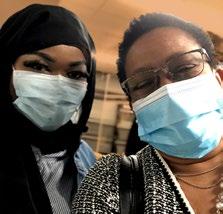


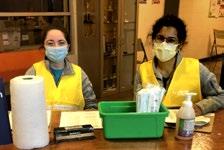
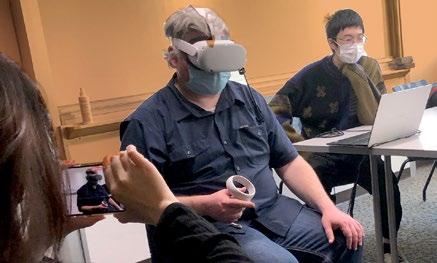
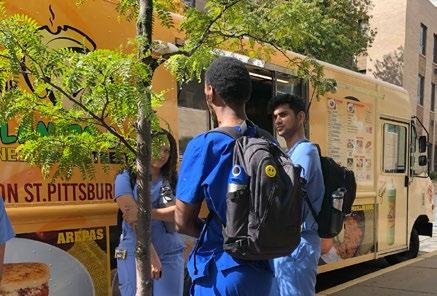
Real

18 University of Pittsburgh
Inclusion Annual Report 19
2021–22 Health Sciences Diversity, Equity and
Paula K. Davis, MA, CDE Associate Vice Chancellor for Diversity, Equity and Inclusion, Health Sciences
Lisa Strother Upsher, MSOL Director
Bee Schindler, EdD, MSW Assistant Director
Noble A-W Maseru, PhD, MPH Director of Social Justice, Racial Equity and Fac ulty Engagement, Health Sciences
Karla Perelstine MEd Communications Specialist
Mary Ann Merranko Administrative Assistant
Rear, from left: Noble A-W Maseru, Bee Schindler, and Karla Perelstine Foreground, from left: Paula Davis, Mary Ann Merranko, and Lisa Strother Upsher
Empathy, a virtual reality simulation developed in part nership with the Department of Medicine helps students engage with the cultural contexts of care.
Pre-Health Scholars Welcome
Dental Medicine students celebrate Latinx and Hispanic Heritage Month with Venezuelan fare
Diversity Deans Retreat
Medical Students Volunteer at COVID-19 Vaccine Clinic Programs and events help us stay connected to campus
and community






20 University of Pittsburgh 2021–22 Health Sciences Diversity, Equity and Inclusion Annual Report 21
of
Sciences Diversity, Equity and Inclusion Partnerships Consulting Recruitment Training/Education
Equity
School of Public Health Office
Health
School of Pharmacy School of Dental Medicine School of Medicine School of Nursing School of Health and Rehabilitation Sciences Office of Health Sciences Diversity,
and Inclusion M216E Alan Magee Scaife Hall 3550 Terrace Street Pittsburgh, PA 15261 Phone: 412-648-2066 Fax: 412-383-5728 diversity@hs.pitt.edu healthdiversity.pitt.edu
https://www.youtube.com/channel/UCFcNzF8L_OoRCZI-PxOTzog https://twitter.com/PittHSDiversity https://www.facebook.com/groups/202236102541 https://www.instagram.com/pittohsdei/ Some photos in this publication were taken prior to the COVID-19 pandemic and may not reflect current health and safety guidelines. The University of Pittsburgh is an affirmative action, equal opportunity institution. Produced by: Office of Strategic Communications, Health Sciences




 —Anantha Shekhar, MD, PhD Senior Vice Chancellor for the Health Sciences, and John and Gertrude Petersen Dean, School of Medicine
—Anantha Shekhar, MD, PhD Senior Vice Chancellor for the Health Sciences, and John and Gertrude Petersen Dean, School of Medicine


 Paula K. Davis, MA, CDE Associate Vice Chancellor for Diversity, Equity and Inclusion Schools of the Health Sciences
Paula K. Davis, MA, CDE Associate Vice Chancellor for Diversity, Equity and Inclusion Schools of the Health Sciences










 Director
Director



 —Noble
—Noble
























